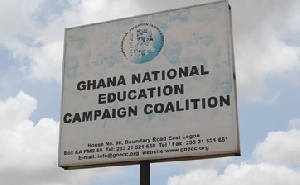The Ghana National Education Campaign Coalition (GNECC) is calling on the government as a matter of urgency to review its policy on private education to ensure that quality education is not compromised as well as protect the poor against discrimination.
GNECC believes that such an objective could be achieved if government makes available resources that could lead to promotion of equity and quality basic education.
Government education policy orientation shows enormous support for expanded privatisation of basic education.
GNECC argues that education is a public good and so it wants a policy framework that will guarantee social justice and equity in the provision of education in Ghana.
National Coordinator for GNECC, Mr Leslie Tettey, at a news conference in Accra, called on Government to ensure that private schools only supplement, rather than supplant the public education system.
The press conference was on the theme “Education Privatization in Ghana and Its Impact on the Realization of the Right to Education”.
“It is only through a quality public education system that we will achieve equitable education for all,” Mr Tettey stressed.
Mr Tettey asked government to engage the country's Development Partners such as Department for International Development (DfID) and the World Bank to consider full orientation of international support towards public education, in line with Ghana's obligations to focus its efforts on its core obligations towards the most vulnerable groups in society.
While GNECC admits that the laws of Ghana allow for private participation in education, it insists that Government must strengthen the regulatory and monitoring systems so that private provision is consistent with the Convention on the Rights of the Child.
Answering questions at the event, Mr Peter Korda, Public Relations Officer of the Ghana National Association of Teachers, bemoaned the lack of teacher motivation as one of the causes of low performance in the public basic schools.
He called for a holistic approach to address the problem.
Mr Korda regretted the lack of attention on the part of some parents in respect of the education of their children at the basic level, especially those in the public sector.
He cited as an example, the practice where some parents in certain parts of the country, especially in rural areas, went to schools to pick their children to help them on their farms while classes were ongoing.
General News of Saturday, 1 November 2014
Source: Public Agenda
GNECC wants a review of policy on private education
Entertainment












